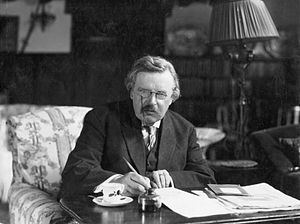A Ballad of Theatricals
Gilbert Keith Chesterton 1874 (Kensington, London) – 1936 (Beaconsfield, Buckinghamshire)
Though all the critics' canons grow-
Far seedier than the actors' own-
Although the cottage-door's too low-
Although the fairy's twenty stone-
Although, just like the telephone,
She comes by wire and not by wings,
Though all the mechanism's known-
Believe me, there are real things.
Yes, real people-even so-
Even in a theatre, truth is known,
Though the agnostic will not know,
And though the gnostic will not own,
There is a thing called skin and bone,
And many a man that struts and sings
Has been as stony-broke as stone . . .
Believe me, there are real things
There is an hour when all men go;
An hour when man is all alone.
When idle minstrels in a row
Went down with all the bugles blown-
When brass and hymn and drum went down,
Down in death's throat with thunderings-
Ah, though the unreal things have grown,
Believe me, there are real things.
ENVOY.
Prince, though your hair is not your own
And half your face held on by strings,
And if you sat, you'd smash your throne-
-Believe me, there are real things.
Font size:
Submitted on May 13, 2011
Modified on March 05, 2023
- 57 sec read
- 116 Views
Quick analysis:
| Scheme | ababbcbC ababbcbC ababxcbC bcbC |
|---|---|
| Closest metre | Iambic tetrameter |
| Characters | 1,012 |
| Words | 186 |
| Stanzas | 4 |
| Stanza Lengths | 8, 8, 8, 4 |
Translation
Find a translation for this poem in other languages:
Select another language:
- - Select -
- 简体中文 (Chinese - Simplified)
- 繁體中文 (Chinese - Traditional)
- Español (Spanish)
- Esperanto (Esperanto)
- 日本語 (Japanese)
- Português (Portuguese)
- Deutsch (German)
- العربية (Arabic)
- Français (French)
- Русский (Russian)
- ಕನ್ನಡ (Kannada)
- 한국어 (Korean)
- עברית (Hebrew)
- Gaeilge (Irish)
- Українська (Ukrainian)
- اردو (Urdu)
- Magyar (Hungarian)
- मानक हिन्दी (Hindi)
- Indonesia (Indonesian)
- Italiano (Italian)
- தமிழ் (Tamil)
- Türkçe (Turkish)
- తెలుగు (Telugu)
- ภาษาไทย (Thai)
- Tiếng Việt (Vietnamese)
- Čeština (Czech)
- Polski (Polish)
- Bahasa Indonesia (Indonesian)
- Românește (Romanian)
- Nederlands (Dutch)
- Ελληνικά (Greek)
- Latinum (Latin)
- Svenska (Swedish)
- Dansk (Danish)
- Suomi (Finnish)
- فارسی (Persian)
- ייִדיש (Yiddish)
- հայերեն (Armenian)
- Norsk (Norwegian)
- English (English)
Citation
Use the citation below to add this poem to your bibliography:
Style:MLAChicagoAPA
"A Ballad of Theatricals" Poetry.com. STANDS4 LLC, 2024. Web. 25 Apr. 2024. <https://www.poetry.com/poem/15954/a-ballad-of-theatricals>.



Discuss the poem A Ballad of Theatricals with the community...
Report Comment
We're doing our best to make sure our content is useful, accurate and safe.
If by any chance you spot an inappropriate comment while navigating through our website please use this form to let us know, and we'll take care of it shortly.
Attachment
You need to be logged in to favorite.
Log In